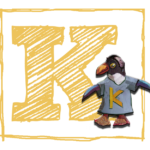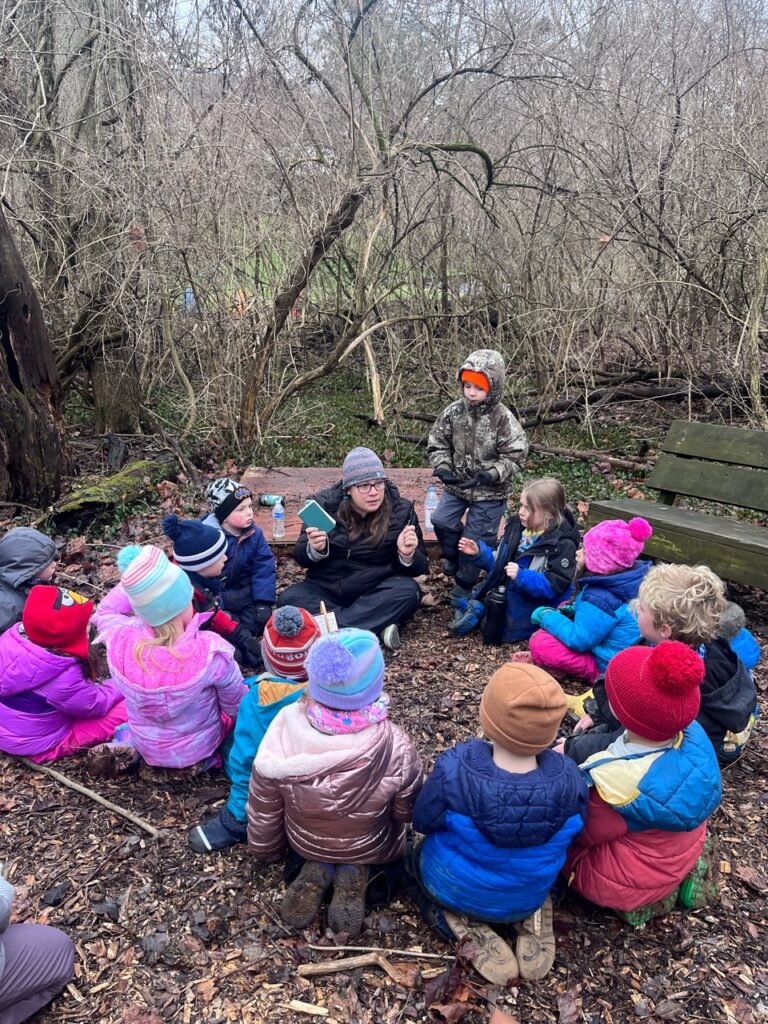7171 N Pennsylvania St, Indianapolis, IN 46240
A Cooperative Preschool Established in 1960

Tuesdays, Wednesdays & Thursdays, 9 am – 2 pm
Age Requirement: 5 years old by September 1st
The goal for our kindergarteners is to prepare children for first grade, guided by Indiana standards, common core standards, and children’s interests. In our program, children learn through active exploration and social interaction, which is how children this age learn best. While no two days are ever exactly the same, the kindergarten schedule provides comfort in predictable structure and routine. It is a fast-paced day, enabling the children to learn many things in different ways, while accommodating their high level of energy.

Literacy Groups and Table Work
Each day, our Kinderbird teacher engages small groups of students in a literacy lesson. Miss Jennie uses a balance of explicit, phonics-based instruction and the workshop approach to reading and writing. Students learn the specific skills they need to read conventionally (foundational phonological awareness skills, letter identification and formation, sound recognition and blending, sight word instruction, etc.), while also having the opportunity to practice comprehension skills, build their identities as capable readers and writers, and fall in love with literacy through activities like book-making and read alouds.
Math Groups and Table Work Rotations
Students participate in a daily small group math lesson. Kinderbird math is all about building number sense and foundational math skills that will set them up for success as they continue on their academic journeys. A math lesson typically begins with a fluency warm-up or game to get our math brains flowing and is followed by a quick mini-lesson based on the Indiana math standards. Math workshop concludes with students getting to practice that day’s teaching point through hands-on activities or problem-solving work.
Emergent Curriculum
Our Kinderbird program uses an emergent approach to curriculum. This means that the projects and topics of in-depth study are not determined ahead of time, but rather are based upon children’s interests and curiosities. Projects are child-initiated, with the teacher/adults acting as guides and sources of information. All projects have some kind of cumulative final presentation that is determined and created by the students. Examples of this can include class books, class museums, performances, art pieces, presentations and more.
Read Aloud
No matter whether the Kinderbirds end their school day inside or outside, they always finish up with a chapter from whichever story book the class has been engaged in reading. This fosters a love of reading as the children look forward to seeing where the story will take them each day!
Arrival, Sign-In, and Floor Games
Every morning, students are greeted by the teacher as they enter the main classroom and put their belongings away. Students then sign in and join in with friends to play board games, do puzzles, or play with math or literacy manipulatives as a soft start to the day while the rest of our friends are filtering in.
Morning Meeting
Every morning, the class gathers for morning meeting. The familiarity of this routine is something the children look forward to, and it often becomes everyone’s favorite part of the day! We sing songs, greet one another by name, play a community-building game, and read a morning message. During morning meeting, we address many of the Kindergarten standards like days of the week, weather, counting by ones and tens, etc. We always review the day’s agenda so children feel prepared for the day.
Free Play/Explore
During this time, children are free to move among the three rooms and engage in whichever activities they choose. Activities such as painting, drawing, play manipulatives, dress-up, giant wooden blocks, and a sensory table are always available; alternating activities may include climbing on the wooden climber, building with gigantic tinker toys, playing a sport, helping mix ingredients for a baking/cooking project, working at a simulated store or other dramatic play, or creating a special art project. This is the time for continuing project work and investigations based on children’s interests.
Lunch & Snack
The children bring their lunches and eat together each school day. Food sensitivities and allergies are accommodated.
Each afternoon, a snack option is provided by the school or families are welcome to pack a snack from home. Food sensitivities and allergies are accommodated.
Quiet Time
During quiet time, the children lie or sit peacefully on carpet squares or yoga mats while lights are dimmed and calming music is played. Students quietly read books independently, rest their bodies, or engage in yoga stretches.
Outdoor Play
As long as the temperature is above zero and it is not storming, children experience outdoor play on the school’s well-equipped, half-acre playground every day. Children are free to play on all playground equipment. They also have access to tricycles, sand toys, sleds, and other seasonal toys. The participating parent and teacher are present around the playground to ensure a safe and fun playtime. We encourage the children to have fun and we expect them to get dirty!
Forest Days at Holliday Park
Every month, the Kinderbirds spend at least one full day a month at Holliday Park. These days are full of playground time, nature hikes, journaling, and playing in the Park’s Nature Center. Miss Jennie leads the students through morning meeting, read-alouds, and other academically-minded activities under the shade of a tree or in the middle of the woods.
Forest Classroom
Each week, after the morning meeting, the Kinderbirds enter our Forest Classroom for a day of learning in nature. During this time the lessons of the classroom are simply brought outdoors. The children have the opportunity to learn while being in the outdoors. Lots of exploring and free time happen on these days!
Music
Our music teacher comes once a week to the classroom and leads the class in a music lesson. This is a very interactive and often physical lesson, in which the children learn about pitch, rhythm, tempo, etc. and frequently have the opportunity to play different instruments.
Spanish
Twice monthly our Spanish teacher comes to the classroom for small group Spanish lessons. The class is divided into two small groups and each group gets a chance to work with the Spanish teacher for an engaging, hands-on, music and story-filled Spanish lesson.